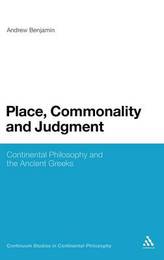
|
Place, Commonality and Judgment: Continental Philosophy and the Ancient Greeks
Hardback
Main Details
| Title |
Place, Commonality and Judgment: Continental Philosophy and the Ancient Greeks
|
| Authors and Contributors |
By (author) Andrew Benjamin
|
| Series | Continuum Studies in Continental Philosophy |
|---|
| Physical Properties |
| Format:Hardback | | Pages:192 | | Dimensions(mm): Height 234,Width 156 |
|
| Category/Genre | Western philosophy - Ancient to c 500 |
|---|
| ISBN/Barcode |
9781441176806
|
| Classifications | Dewey:190 |
|---|
| Audience | | Professional & Vocational | |
|---|
|
Publishing Details |
| Publisher |
Continuum Publishing Corporation
|
| Imprint |
Continuum Publishing Corporation
|
| Publication Date |
14 February 2011 |
| Publication Country |
United States
|
Description
In this important and highly original book, place, commonality and judgment provide the framework within which works central to the Greek philosophical and literary tradition are usefully located and reinterpreted. Greek life, it can be argued, was defined by the interconnection of place, commonality and judgment. Similarly within the Continental philosophical tradition topics such as place, judgment, law and commonality have had a pervasive centrality. Works by Jacques Derrida and Giorgio Agamben amongst others attest to the current exigency of these topics. Yet the ways in which they are interrelated has been barely discussed within the context of Ancient Philosophy. The conjecture of this book is that not only are these terms of genuine philosophical importance in their own right, but they are also central to Ancient Philosophy. Andrew Benjamin ultimately therefore aims to underscore the relevance of Ancient Philosophy for contemporary debates in Continental Philosophy.
Author Biography
Andrew Benjamin is Distinguished Professor of Architectural Theory at the University of Technology, Sydney and Emeritus Professor of Philosophy at Monash University Melbourne.
ReviewsIn Place, Commonality and Judgment: Continental Philosophy and the Ancient Greeks, Andrew Benjamin continues his careful work at the intersection of ontology, aesthetics, and politics... The broad outlines of Benjamin's argument are clear, but I have scarcely done justice to the rich complexity of this book. It is a tour de force of patient textual analysis in Greek, German, French, and English. Furthermore, Benjamin's book provides an alternative to two dominant readings of Greek thought in Continental philosophy, Derrida's and Agamben's. -- Notre Dame Philosophical Review
|